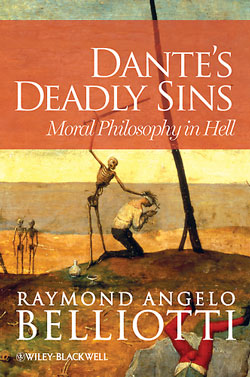 |

A unique analysis of the moral philosophy behind Dante’s masterpiece, the “Commedia,” is presented by Dr. Raymond Angelo Belliotti (at left), Distinguished Teaching Professor of Philosophy, in his new book, “Dante’s Deadly Sins: Moral Philosophy in Hell.”
Belliotti draws new and unique insights from the “Commedia,” Dante’s evocative image of the afterlife, human punishment and redemption that many consider one of the greatest works of world culture. He analyzes the “Commedia” in fresh moral terms that connect the poem’s major themes to our own contemporary condition. The result is a lively dialogue, created by Belliotti, between this example of classic literature and modern life.
“Dante’s Deadly Sins” considers the “Commedia” to be a practical guide to moral betterment, and by focusing on “Inferno” and “Purgatorio,” Belliotti examines the puzzles and paradoxes of Dante’s moral assumptions, his treatment of the seven deadly sins and how 10 of his most powerful moral lessons anticipate modern existentialism.
Throughout “Dante’s Deadly Sins,” his 11th book, Belliotti conveys Dante’s enduring significance as a moral philosopher, though he’s known primarily as an extraordinary poet.
“Dante’s Deadly Sins” has earned Belliotti praise from Robert Ginsberg, director of The International Center for the Arts, Humanities, and Value Inquiry. “Belliotti demonstrates remarkable parallels between Dante’s moral vision and modern Existentialist philosophy. He skillfully elucidates moral possibilities that we too confront when challenged by evildoing, punishment, freedom and love,” Ginsberg said.
Dante’s “Inferno” and “Purgatorio” are infused with disturbing images of sinners who become their sins, Belliotti said. “For example, those who were gluttons on earth are mangled and themselves consumed in the afterlife; the lustful are forever caught in a chaotic wind.”
Belliotti emphasizes the moral implications of these poems, explaining and evaluating Dante’s understanding of the seven deadly sins and the ultimate role they play as the basis of human transgression.
In connecting the poem’s moral themes to the enduring human condition, Belliotti creates a broad framework for leading a good life that can be shared by religious believers and secular existentialists alike. Virtue is its own reward and sin is its own punishment.
“Dante’s Deadly Sins” is published by Wiley-Blackwell, the international, scientific, medical and scholarly imprint of John Wiley & Sons. Subjects other books written by Belliotti include issues of jurisprudence, sexual ethics, ethnic identity, Nietzsche, the meaning of life, human happiness, philosophy and baseball, Machiavelli and Roman philosophy.



